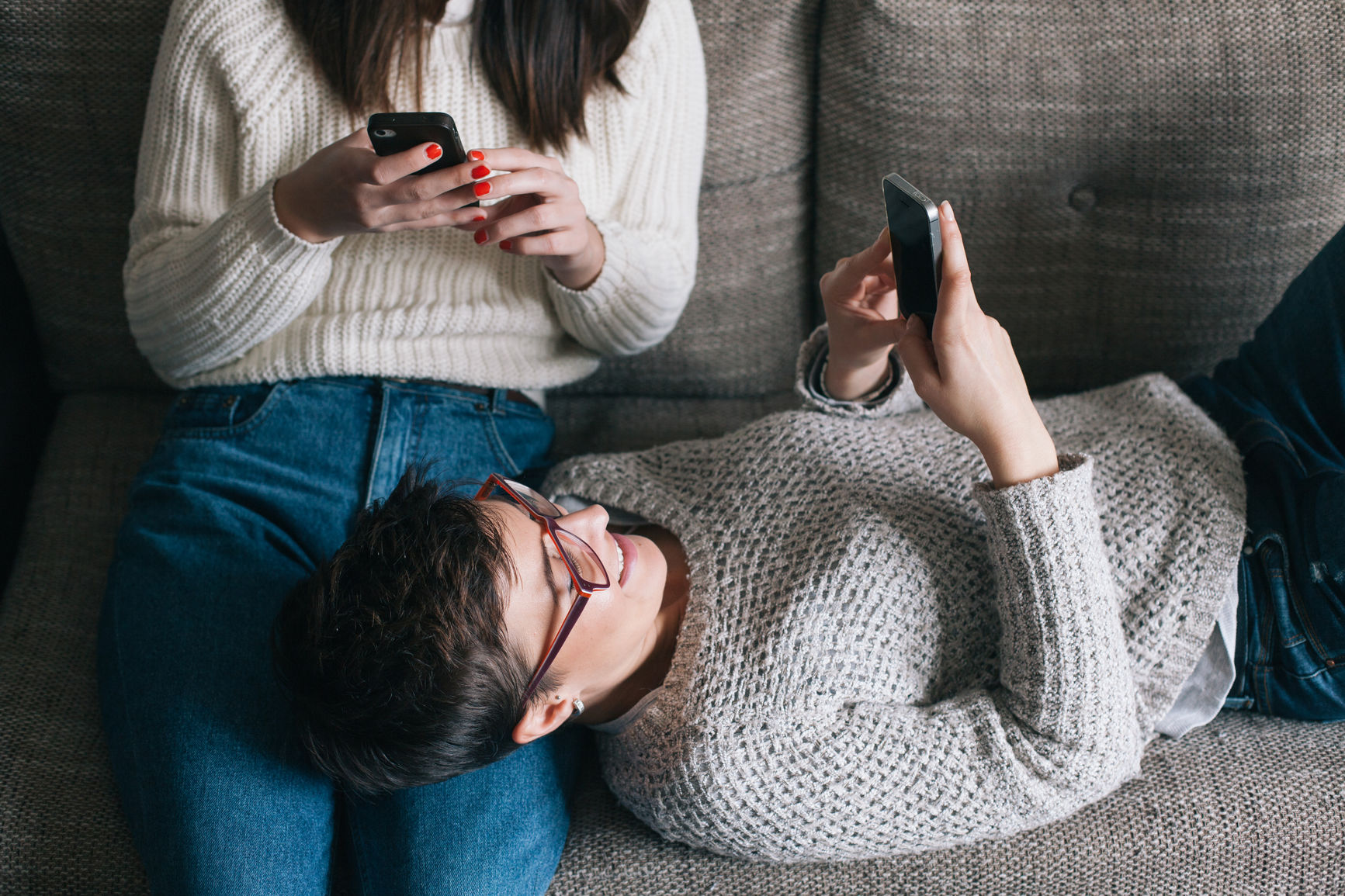-
Many of us have been guilty of it at some stage: you’re deep in conversation with someone you care about only to be distracted by the flash of a notification on your phone.
If you’re not careful, you can end up zoning out completely – leaving the person you’re speaking with feeling frustrated and undervalued.
This behaviour is called ‘phubbing’ – yep, that’s short for ‘phone snubbing’ – and it could be having a bigger impact on your relationships than you realise.
Why can’t we resist the urge to stay connected to our devices – even prioritising them over real-life connection?
Clinical psychologist Emily Toner says the reason the need to check your phone can feel so impulsive may be a result of intermittent “positive reinforcement”.
“You check your phone and there is nothing there, you check it again and nothing, then the third time you check, there is a ‘like’ or an email, or a message, and this is when you get the hit,” she explains.
“[This is] a literal dopamine hit in the nucleus accumbens of the brain – the same part that is activated if you take drugs or gamble. So, it’s hard for us to disengage because we are literally addicted to engaging with our device.”
How can phubbing affect our relationships?
Emily says our phone habits can have a big impact on how we relate to others. Whether it’s your friends, your partner or your kids, people can tell when they are being ignored – and can internalise negative feelings as a result.
“Smartphone use may have a detrimental effect on our important relationships, as well as a negative impact on our relationship with ourselves… What we know now is that we also tend to devalue ourselves when someone isn’t paying attention to us,” says Emily.
“The devaluing process generally goes like this: you first have the thought, ‘What I’m saying is not very interesting…’ followed by the subconscious thought, ‘I must not be a very interesting person.’
Research has found that being on the receiving end of phubbing triggers a negative mood in us and feelings of ostracism – and reduces feelings of intimacy in a conversation1.
According to one study2, being phubbed repeatedly in a conversation – three times rather than once – increased these negative feelings.
Tips to stop phubbing
Guilty of getting easily distracted by your phone? You might want to consider using your phone less. Here are Emily’s top tips to keep your phone habits in check:
Be selective with notifications
Do you really need an alert every time you get a new email or a new follower on Instagram? Use your phone’s settings to select only the notifications you really need, so you are interrupted less often.
“It might feel uncomfortable initially but after a day or two you really won’t miss them,” says Emily. “This creates more space for uninterrupted moments of face-to-face connection throughout your day.”
Get an alarm clock
Out of sight, out of mind. Emily suggests that using something other than your phone to wake you up in the morning – such as a physical alarm clock – means you’ll be less tempted to get sucked into your phone first thing.
“Starting your day phone-free will set you up to feel good from the get-go,” she says.
“Your first moments will be filled with connecting with yourself, your partner or kids – instead of the stress of checking emails or scrolling social feeds.”
Mind your manners
To help increase the quality of your face-to-face interactions, Emily suggests practising mindfulness when you’re in a conversation.
“Connect to your senses, look into their eyes and notice subtle changes about the person as they speak,” she says.
“A nice little trick is to imagine you are seeing them for the first time, even if it’s your boss you see every day.
“Pretend every time you meet someone it’s for the first time and enjoy the presence and connection that comes with it.”
How to improve your connection with others
Putting your phone out of reach or on silent for parts of your day can encourage more meaningful conversations with family and friends.
Connecting with others is good for us. Regular social interactions can help reduce anxiety and depression, and boost self-esteem.
Whether it’s by nurturing the relationships with the people closest to us, or by getting involved in a community like parkrun, connecting with people can be a massive help for our mental health.
To help make relationships a priority in your life, have a think about how much time you are currently spending with the people you care about. Maybe it’s not as much as you’d like.
If that’s the case, you may like to start assessing aspects like your work-life balance, practice your active listening skills – or you could simply set aside more time to spend with your friends and family. Even something simple like locking in one meal a week as a family can go a long way to establishing a sense of regular connection.
And, yes, you’ll probably want to put your phones away while you’re at the table.
How to seek mental health support
If you are experiencing mental health struggles, a good place to start the discussion about getting help is with your GP.
Medibank's 24/7 Medibank Mental Health Support is also available for all Medibank health insurance members. Talk with a mental health professional over the phone or online about any mental health or emotional concern and get guidance on what you can do next. Chat online or call 1800 644 325 any time of the day or night, 7 days a week at no extra cost.*
If you, or someone you know, need immediate support or medical assistance, contact 000 in an emergency or Lifeline on 13 11 14.
How is ‘phubbing’ hurting your relationships?


Get together and have a tasty conversation.
The Medibank Family Roast is a card game designed to get families connecting and talking. Because when the bonds of family are stronger, Australia is stronger. So get around the dinner table, it’s time to serve the questions you’ve always wanted to know the answer to.
-
How to practice active listening
Having a meaningful conversation means learning how to really listen. Learn about the benefits of active listening and how to be a better listener when it really counts.
-
The power of opening up
How can being vulnerable help us feel more connected to those around us?
-
Why connection matters
Having strong, healthy relationships is crucial for our health , but we all have different connection needs. Find out why connecting with loved ones matters, and the signs you need to reach out.
Things you should know
* Some referred services may involve out of pocket costs and waiting periods may apply.
1 Phubbing behavior in conversations and its relation to perceived conversation intimacy and distraction: An exploratory observation study https://www.sciencedirect.com/science/article/abs/pii/S0747563219302225
2 Feeling Ostracized by Others’ Smartphone Use: The Effect of Phubbing on Fundamental Needs, Mood, and Trust https://pmc.ncbi.nlm.nih.gov/articles/PMC9285876/


